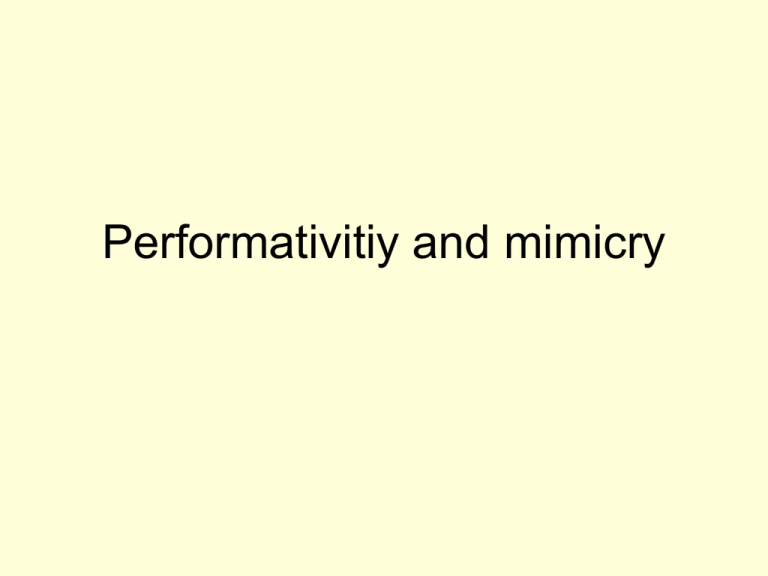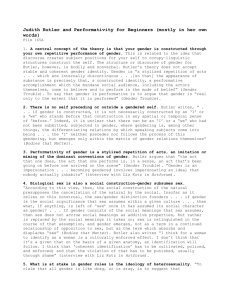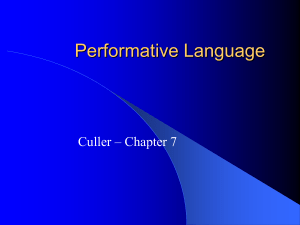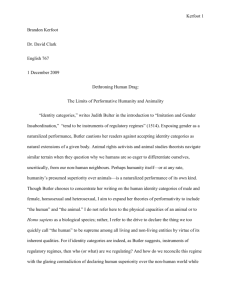Performativity
advertisement

Performativitiy and mimicry • Performativity: linguistics – cultural theory (Judith Butler) Performativity in language • Constative – performative (J. L. Austin) • Grice: felicity conditions principle of cooperation: contribute when required, and make it such as is required speech acts • locution, illocution, perlocution • “It is raining” Performativity and literature • J. L. Austin: „A performative utterance will, for example, be in a peculiar way hollow or void if said by an actor on the stage, or if introduced in a poem, or spoken in soliloquy. This applies in a similar manner in any and every utterance – a sea-change in special circumstances. Language in such circumstances is used not seriously, but in ways parasitic upon its normal use – ways which fall under the doctrine of the etiolations of language.” (How To Do Things with Words) Performativity and literature • Literature: aberrant, parasitical, secondary, etiolated • Exclusion of literature: non-serious, “quasi speech acts” (Richard Ohmann), “pretence” (Searle) Derrida, literature and performativitiy • Iterability, citationality: common to all speech acts • “For, finally, is not what Austin excludes as anomalous, exceptional, ʻnonserious,’ that is, citation (on the stage, in a poem, or in a soliloquy), the determined modification of a general citationality or rather, a general iterability - without which there would not even be a ʻsuccessful performative’?” (Derrida: The Margins of Philosophy) Performative utterances (explicit performatives) • no ʻcontent’ apart from performing a verbal act, bringing about some change in the state of things • inaugurations: I declare this meeting/factory open • court sentences • baptism • insult PROMISING • Spouse: spondere (‘to bind oneself, promise solemnly’) sponde: an offering (Manzoni: I promessi sposi) • “Promise me friendship, but perform none: if thou wilt not promise, the gods plague thee, for thou art a man! if thou dost perform, confound thee, for thou art a man!” (Sh, Timon of Athens, IV, iii) • true or false vs felicitous or infelicitous • failure: misfire or abuse Don Juan’s performative promises • • • • • • • • • • • • • • • • • • DJ. azonnal házasságra lépek veled Aminta: Csak ne csapj be! DJ: Vétkeznék, ha becsapnálak. Aminta: Esküdj meg, hogy teljesíted ígéreted, s hogy nem álttsz. DJ: Asszonyom, fehér kezedre, Poklok frissen hullt havára Esküszöm: szavam megtartom! Aminta: Istenre esküdj, hogy átka Sújtson rád, ha megcsalsz engem. DJ: Jó, ha meg nem tartanám a Szót, mit adtam, Istent kérem, Ne méltasson irgalmára, S öljön meg egy (félre) ... halott (fennh.) ...ember. (Félre) S óvjon ég, ha élő támad. Aminta: Esküdnek hiszek, tekints hű Nődnek hát. (Tirso de Molina: Don Juan) grammatical(?) markers of the performative first person singular (or plural), present tense • What happems if we change these parameters? • Performative → constative • „I promise” = I describe my act of making a promise • “A lover’s vow, they say, is no vow at all” (Plato) • “Csak nyelvem esküdött, eszem nem volt vele” (Euripidész: Hyppolitos) • non-performative speech acts may have strong performative effects: warning, threat, flattery, provocation • (agent provocateur) seduction • Felicity= happiness • „It is extremely sweet to seduce a young beauty’s heart to submission, through a hundred flatteries ... But once you are master, there is no more to say, nor anything left to wish for; the best part of the passion is spent” (Molière: Don Juan) • ʻShall I compare thee to a summer’s day?’ he inquired politely. • ʻNo thanks!’ I said. (Robert Nye: Mrs Shakespeare: The Complete Works) • • • • • • • • • • • • • • Shall I compare thee to a summer’s day? Thou art more lovely and more temperate. Rough winds do shake the darling buds of May, And summer’s lease hath all too short a date. Sometime too hot the eye of heaven shines, And often is his gold complexion dimmed; And every fair from fair sometime declines, By chance, or nature’s changing course, untrimmed; But thy eternal summer shall not fade, Nor lose possession of that fair thou ow’st, Nor shall death brag thou wand’rest in his shade, When in eternal lines to Time thou grow’st. So long as men can breathe, or eyes can see, So long lives this, and this gives life to thee. (Sonnet 18) • The distinction between performative and constative is weakened • Austin: “Very commonly the same sentence is used on different occasions of utterance in both ways, performative and constative, … the thing seems hopeless from the start” (How to Do Things With Words). • Homi Bhabha: pedagogical and performative aspects of language use STRONG PERFORMATIVES • Word magic, incantation, spell • “Let there be light;” “Let there be a firmament in the midst of the waters”; “Let us make man in Our image, according to Our likeness” (Gen. 1: 3, 6, 26). “In the beginning was the Word, and the Word was with God” (John 1: 1). • “man lives from every word that proceeds from the mouth of the Lord” (Deut. 8:3). • “All other things may be expressed in some way; He alone is ineffable, Who spoke and all things were made. He spoke and we were made; but we are unable to speak of him. His Word, by Whom we were spoken, is His Son. He was made weak, so that He might be spoken by us, despite our weakness.” (St. Augustine: De Magistro) Performativity in culture • • • • • • • • • • • • • Hermia: “My good Lysander, I swaer to thee by Cupid’s strongest bow, By his best arrow with the golden head, By the simplicity of Venus’s doves, By that which knitteth souls and prospers loves, And by the fire which burned the Carthage queen When the false Trojan on the sail was seen, By all the vows that ever men have broke – In number more than ever women spoke, In that same place thou hast appointed me Tomorrow truly I will meet with thee. (Midsummer I.1.168-78) Performativity, agency, authority • Austin: “Actions can only be performed by persons, and obviously in cases [of explicit performatives] the utterer must be the performer.” • We, therefore, the Representatives of the United States of America, in General Congress, Assembled, appealing to the Supreme Judge of the world for the rectitude of our intentions, do, in the Name, and by Authority of the good People of these Colonies, solemnly publish and declare, That these United Colonies are, and of Right ought to be Free and Independent States, that they are Absolved from all Allegiance to the British Crown, and that all political connection between them and the State of Great Britain, is and ought to be totally dissolved; and that as Free and Independent States, they have full Power to levy War, conclude Peace contract Alliances, establish Commerce, and to do all other Acts and Things which Independent States may of right do. (Thomas Jefferson, The Declaration of Independence) • Sandy Petrey: “It was through speaking in the name of the American people that the delegates produced a people to name; it was by invoking an authority that they established an authority to invoke.” • Derrida: the signers “do not exist as an entity, the entity does not exist before this declaration, not as such. If it gives birth to itself, as free and independent subject, as possible signer, this can hold only in the act of signature. The signature invents the signer.” • Declarations: Austin’s exercitives (“a decision that something is to be so”); here “saying makes it so” and “we bring about changes through our utterances” • John Searle: “Declarations bring about some alternation in the status or condition of the referred to object or objects solely by virtue of the fact that the declaration has been successfully performed.” Performativity and power • Whose is the authority? • the judge cites the law • The subject repeats, reiterates, cites, mimes gestures and phrases of power • discourse precedes and enables the ʻI’ • the ʻI’ only comes into being through being called, named Performativity in culture • US Army Pentagon Policy instituted in 1993 (the “Don’t ask, don’t tell policy”) • “Sexual orientation will not be a bar to service unless manifested by homosexual conduct. The military will discharge members who engage in homosexual conduct, defined as a homosexual act, a statement that the member is homosexual or bisexual, or a marriage or attempted marriage to someone of the same gender.” • Until 1993: “Homosexuality is incompatible with military service” Judith Butler and the performativity of gender • Judith Butler: Gender Trouble, Bodies That Matter • “one is not born, but rather becomes a woman” (Simone de Beauvoir) • ʻwoman’ is something we ʻdo’ rather than something we ʻare’ performance vs performativity • Performance: theatrical aspect (script and actor); there is already a subject who performs, who does the performance • Performativity: the performer does not preexist the performance • „It’s a girl!” „It’s a boy!” • „the term or, rather, its symbolic power, governs the formation of a corporeally enacted femininity that never fully approximates the norm. This is a “girl,” however, who is compelled to “cite” the norm in order to qualify and remain a viable subject. Femininity is thus not the product of a choice, but the forcible citation of a norm, one whose complex historicity is indissociable from relations of discipline, regulation, punishment. (Judith Butler: Bodies That Matter 232) • “It is a girl”: not a constative, but an interpellation that initiates the process of ʻgirling’, a process based on perceived and imposed differences between men and woman, differences that are cultural • a subject is a subject-in-process that is constructed in discourse(s) by the acts it performs • a series of acts, little performances • Butler: gender “is the repeated stylization of the body, a set of repeated acts within a highly rigid regulatory frame that congeal over time to produce the appearance of substance, of a natural sort of being.” (Gender Trouble) Retroactive subjectivity • “Indeed, I can only say "I" to the extent that I have first been addressed, and that address has mobilized my place in speech; paradoxically, the discursive condition of social recognition precedes and conditions the formation of the subject: recognition is not conferred on a subject, but forms that subject Further, the impossibility of a full recognition, that is, of ever fully inhabiting the name by which one's social identity is inaugurated and mobilized, implies the instability and incompleteness of subject-formation. The "I" is thus a citation of the place of the "I" in speech, where that place has a certain priority and anonymity with respect to the life it animates: it is the historically revis-able possibility of a name that precedes and exceeds me, but without which I cannot speak” (Bodies That Matter 225) • One is not born but rather becomes a woman – both terms of this equation are unfixed • Butler: “woman itself is a term in process, a becoming, a constructing that cannot rightfully be said to originate or to end. As an ongoing discursive practice, it is open to intervention and resignification. Even when gender seems to congeal into the most reified forms, the congealing is itself an insistent and insidious practice, sustained and regulated by various social means. It is, for Beauvoir, never possible finally to become a woman, as if there were a telos that governs the process of acculturation and construction.” (Gender Trouble 33) • “There is no gender identity behind the expressions of gender; that identity is performatively constructed by the very ʻexpressions’ that are said to be its results.” (Gender Trouble 25) Putting on gender • Freedom in (gender) identity • We cannot choose the clothes but can alter them subversively Performance as subversion • Performance as ‘accomplishment’, completion of a task • Performance as show, spectacle • (showing that the second is always there in the first) • Joan Rivière: Womanliness as masquerade) • performativity, parody, drag as ways of subverting gender: overdoing things in order to show forth their constructedness • if all gender is a form of enactment, miming of a kind of unreachable ideal, then all gender is in fact parody drag • “In imitating gender, drag implicitly reveals the imitative nature of gender itself – as well as its contingency” (GT 137) Cindy Sherman: Untitled Film Stills MIMICRY • Gender performance: cultural survival modell 1. Minta(darab). Műsz. Öntőminta. Ruha Eredeti terv alapján készült (egyedi) ruha(darab). • 2. Építménynek, szerkezetnek méretarányosan kicsinyített mása. A gép ~je. Repülőmodell. Hajómodell. • 3. Az, akiről, amiről képet, szobrot, es. irodalmi ábrázolást készítenek. Műv. Ilyen alkotáskor a művésznek díjazásért mintaként álló, ülő stb. személy. ~t áll v. ül vkinek. Fotómodell. Manöken. • (Magyar Értelmező Kéziszótár 2003) • „Az utánzás vele született tulajdonsága az embernek gyermekkorától fogva. Abban különbözik a többi élőlénytől, hogy a legutánzóbb természetű, sőt eleinte éppen az utánzás útján tanul is; mindegyikünk örömét leli az utánzásban” • (Arisztotelész: Poétika 10) Batesian mimicry Batesian mimicry • A palatable animal mimics an impalatable/poisonous one • (e.g. Monarch butterfly Owl moth Mimicry camouflage gecko Mimicry camouflage • Gender: a corporeal style, a bodily performance the am of which is cultural survival, blending in the environment, being accepted a sa certain kind of being Mimicry as subjectivity • (1) it carries with itself this biological ballast • (2) bad (faulty) mimesis, imitation in the order of subjectivity and identity • (3) human subjects as being produced as/by representations Colonial mimicry (Homi Bhabha) • • • • (1) colonial strategy of reproduction Result: grotesque mimicry “almost the same but not quite” the necessary failure: flawed colonial mimesis (Bhabha) • Mimicry: bad mimesis – imitation without understanding (aping, parroting) • Mimic man: Comic figure Colonial mimicry • (2) the mimic man as potential threat • Uncanny mirror image, double • Parody pf British identity, of racial identity of identity as such • Similarity itself is uncanny • Mimic subjectivity: Olympia in E.T.A. Hoffmann’s ‘The Sandman’ • „Mimicry hides no presence or identity under its mask” (Bhabha, Location 88) (Colonial) mimicry • (3) Mimicry as a conscious strategy of political resistance (~ performativity in Butler) • theatrical aspect: subversive • Excess, overdoing (like in the animal world) Mating dance of grebes Capercaillie Frill-necked lizard Luce Irigaray: Speculum • A nőnek lehetősége van arra, hogy „játsszon a mimézissel, hogy szándékosan öltse magára a női szerepet” (76), vagyis hogy az alávetettség egy formáját affirmációvá változtassa, s ezáltal kisiklassa azt, úgy vetve alá magát a róla kialakított maszkulin elképzeléseknek, hogy közben a játékos ismétlés révén „láthatóvá” tegye azt, aminek láthatatlanul kellett volna maradnia: a szubjektum ábrázolásként, utánzásként, rossz mimézisként való létrejöttét.










